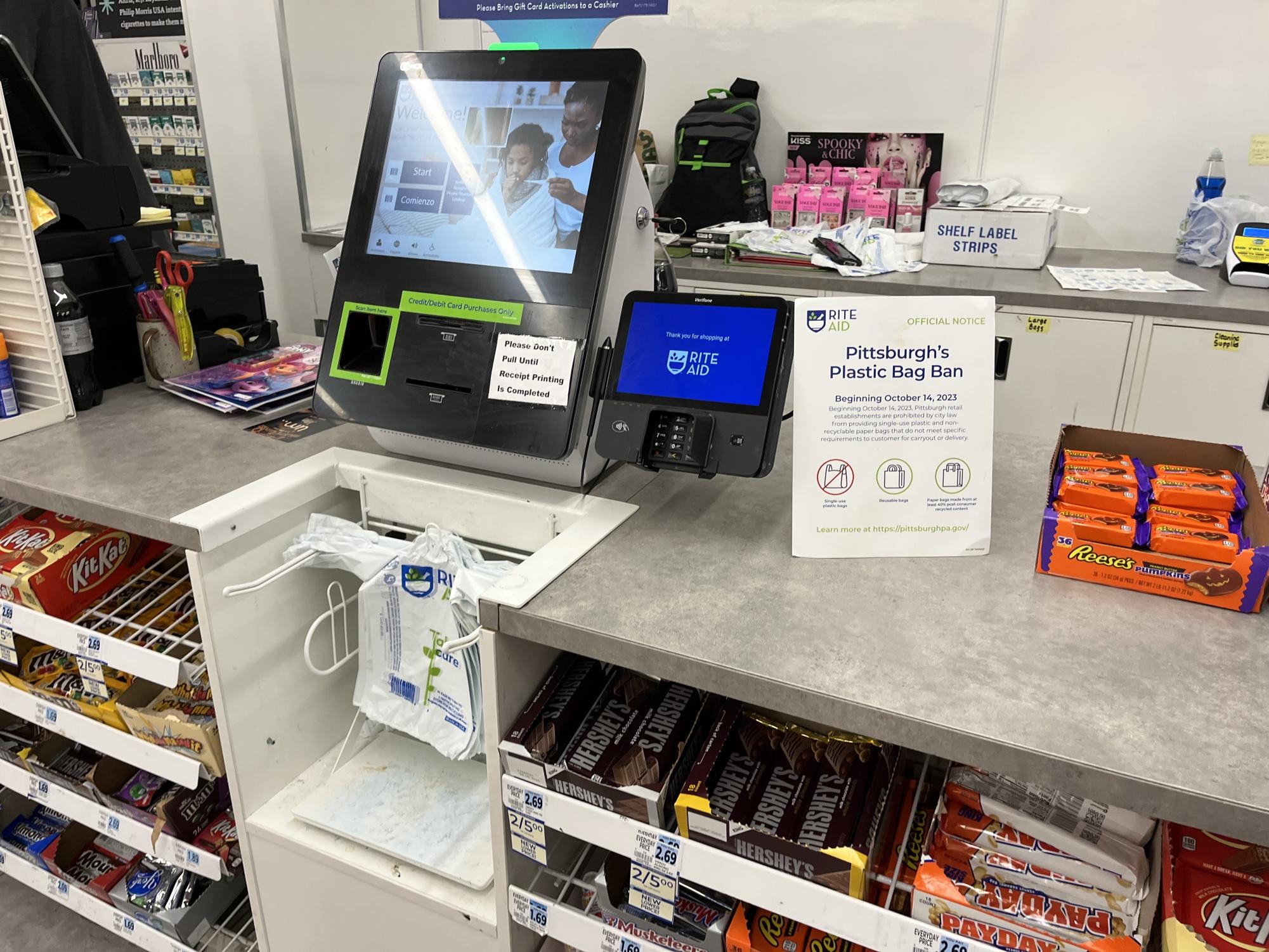Pittsburgh plastic bag ban goes into effect


A sign displaying Pittsburgh’s plastic bag ban in a Rite Aid in Oakland.
For Nick Magoun, a sophomore Japanese major, the plastic bag ban is an important initiative that will bring attention to common behaviors that are not sustainable for the environment.
“Businesses in the city of Pittsburgh are estimated to distribute 110 million single-use plastic bags each year,” Magoun said. “Most of them end up in landfills or become litter. Switching to paper bags allows for easier recycling, and the bag fee will encourage people to adopt the habit of carrying reusable bags.
The plastic bag ban goes into effect Oct. 14 throughout Pittsburgh. The ban was initially approved by the city in April 2022, but was pushed back to allow businesses to prepare. Shoppers will be expected to carry reusable bags or pay a 10-cent fee for each paper bag used in-store.
Tobias Raether, environmental enforcement manager for the city of Pittsburgh, said the goal of the ban is not to recoup money from businesses or to pressure them to immediately change their inventory.
“We’ve added an additional grace period until Jan. 1, 2024,” Raether said. “And again, that’s done with feedback from businesses who even with the initial year warning, and then six months delay, still felt that they might have additional plastic bags on hand. Our goal, obviously, was not just to have those businesses throw those bags away.”
Raether said the ban does not include all plastic bags in stores. He said plastic bags for produce and meat will still be permissible.
“The idea of this ban is that it’s really to replace plastic bags for which there is a good and easy alternative,” Raether said. “So, checkout bags are something that are not necessary, and paper bags or reusable bags are a great alternative to that. As with the bags for produce and meat within the store, a lot of stores don’t allow you to put items before you’ve purchased them in a reusable bag.”
EcoReps is a student-staffed group that leads initiatives to make resident halls more sustainable. Angel Joseph, a junior psychology and film and media studies major, is an EcoRep for Irvis, Panther, and Sutherland Hall. They said their hometown had implemented a similar ban that successfully reduced plastic waste.
“I’m from this city in South India called Kochi,” Joseph said. “It’s in Kerala and we actually have a plastic bag ban for a few years now. I think about four years at this point and honestly, I didn’t think it was terrible. I think it was good at reducing single-use plastic at specific spots, of course not everywhere.”
Joseph said it might take some time for students to get used to the ban.
“It’s going to take a little while, but we’ve all known about the plastic bag ban for more than a year,” Joseph said. “We have slowly been tweaking our behavior so that we rely less on plastic bags, and this ban will throw a lot of people into it completely unintentionally.”
Joseph, assistant store manager of RiteAid, said the store has started using paper bags instead of plastic since the ban has gone into effect.
“We were expecting a lot of upset customers, obviously, with no plastic bags,” Joseph said. “We really haven’t had that yet.”
Joseph said customers have the option of using paper or personal reusable bags in store.
“We’re more interested to see how the paper bags are going to do versus like the reusable ones,” Joseph said. “I think at some point everyone is just going to end up having their own bag and we’re not really going to be using the paper ones that much.”
Pitt also already encourages students to use reusable bags by charging 25 cents for each plastic bag at dining and bookstore locations on campus. Magoun said students will be able to fall into the routine with the plastic bag ban because there have been similar initiatives on campus.
“I think that most college students at Pitt will have a positive opinion on the ban as well,” Magoun said. “Pitt has already taken steps to reduce plastic bag waste on campus. For example, with our decade-old ‘BYOBag’ program, taking away plastic bags entirely isn’t too big of a change.”
Recent Posts
Opinion | School should be in the summer
Although this may be controversial, I believe that from this data, it is evident that…
Weathering the storm: Pittsburgh teams have tackled some of the toughest environments
The end of the year in western Pennsylvania is always marked by two things —…
Notes From an Average Girl // Notes on Book Banning
In this edition of Notes From an Average Girl, senior staff writer Madeline Milchman writes…
To Be Honest // Yup, it is that damn phone
In this edition of To Be Honest, staff writer Evin Verbrugge writes about her phone…
Meaning at the Movies | Portraying Toxic ‘Adolescence’
In this edition of Meaning at the Movies, staff writer Lauren Deaton explores the mini-series…
Opinion | Climate change requires radical, immediate action
Contributing editor Emma Hannan talks about the effects of climate change and the actions cities…

